Intermarkets' Privacy Policy
Donate to Ace of Spades HQ!
aceofspadeshq at gee mail.com
Buck:
buck.throckmorton at protonmail.com
CBD:
cbd at cutjibnewsletter.com
joe mannix:
mannix2024 at proton.me
MisHum:
petmorons at gee mail.com
J.J. Sefton:
sefton at cutjibnewsletter.com
Quick Hits
Arrest in Terrorist Attack on Boise ICE Office: It's an AWFUL
Plus: FBI Raids LA School Superintendent's Home, School District Offices
BAFTA Tourettes Incident Pits the People Who Cancel Over #Racism Against the People Who Cancel Over "Abelism"
CNN: The Economy Is Doing Pretty Well, Just as Trump Claims.
Too Bad It's a Boomcession That Is Leaving So, So Many People Behind.
Democrat "Counter Event" To the SOTU Is, Literally, a Zoo of Lunatics
Trump Directs and Films the Main Political Advetisement for the Midterms
Wednesday Morning Rant
Mid-Morning Art Thread
The Morning Report — 2/25/26
Jim Sunk New Dawn 2025
Jewells45 2025
Bandersnatch 2024
GnuBreed 2024
Captain Hate 2023
moon_over_vermont 2023
westminsterdogshow 2023
Ann Wilson(Empire1) 2022
Dave In Texas 2022
Jesse in D.C. 2022
OregonMuse 2022
redc1c4 2021
Tami 2021
Chavez the Hugo 2020
Ibguy 2020
Rickl 2019
Joffen 2014
maildrop62 at proton dot me
Saturday Evening Movie Thread 04-04-2020 [TheJamesMadison]
The Ace of Spades Saturday Evening Movie Thread Best Movie of the Year Goes to...
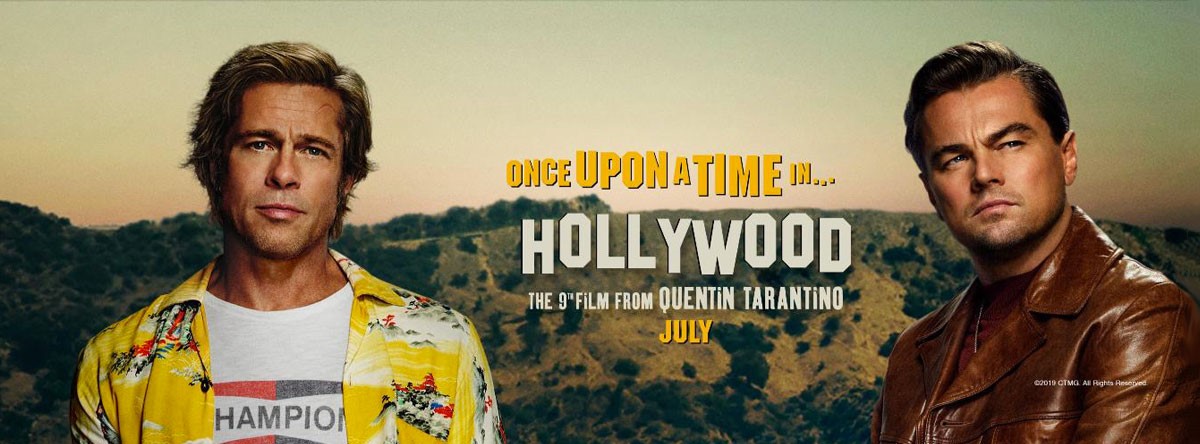
Once Upon a Time ... in Hollywood, the love letter to 1969 Hollywood and hippy punching from Quentin Tarantino.
I called Mr. Tarantino on his personal line and he greeted the great news with such exclamations as, "How did you get this number?" and "Go f yourself, you creep."
He was greatly appreciative.
Mr. Tarantino joins the ranks of the Coen Brothers and Christopher Nolan as winners of this award. Ampersands have been sent via UPS.
Quentin Tarantino
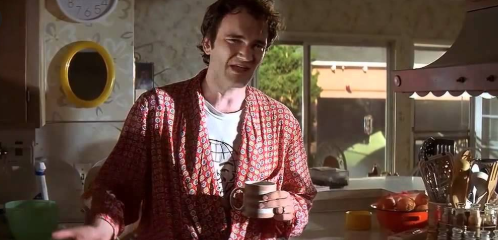
I'll take this opportunity, given Tarantino's win, to write a bit about him as a filmmaker.
I love Tarantino. I don't think he's made a bad film. His worst film, Death Proof is still entertaining if not quite where it could be. He's a massive film nerd and has an encyclopedic knowledge of cinema and its history that makes my own personal knowledge seem infantile by comparison. That massive knowledge bank manifests in several different ways.
Connecting this to my last post, Tarantino actually got very early direct encouragement from Terry Gilliam. Gilliam, as an established filmmaker, took part as a mentor in a seminar for up and coming filmmakers, one of whom was Quentin Tarantino. Tarantino came with the script for Reservoir Dogs, and, of the three mentors assigned to him, Gilliam was the only one who seemed to understand what Tarantino was trying to do.
Reservoir Dogs wasn't the movie that made Tarantino, though, that was, of course, Pulp Fiction, the intelligent and highly entertaining crime comedic drama heist film that jumped between several different timelines, creating a world of characters using highly entertaining dialogue. He followed up with Jackie Brown, Kill Bill, Death Proof, Inglourious Basterds, Django Unchained, The Hateful Eight, and finally Once Upon a Time ... in Hollywood.
Pastiche
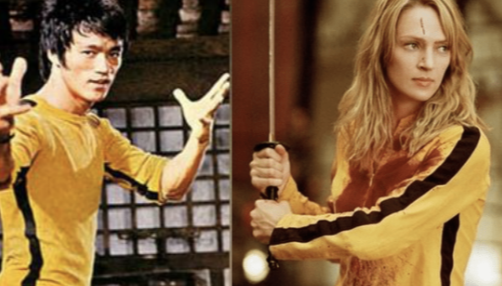
One criticism that gets leveled at Tarantino a lot by his detractors is his unoriginality because his movies are so filled with references to other, earlier works that they feel his work doesn't have a life of its own, that without the references, there'd be nothing there. And there's no denying the references and, to expand it slightly, the fact that Tarantino largely works in pastiche. He's mimicking the things he loved before, but to say that that is the limit of his work is a disservice to his talent and the actual work he outputs.
The title of Django Unchained is a reference to a series of Spaghetti Westerns starring Franco Nero about his titular character Django (who makes a reference as another character in Tarantino's film). And yet, to limit Django to just a rehash of Spaghetti Westerns is to ignore a lot of what goes on in the film.
You could say the same thing about Kill Bill and its Kung Fu influences or Inglourious Basterds (another title that's a reference to a previous movie, Inglorious Bastards) and its World War II movie influences. Yes, they are there and they are prevalent, but if that's all that one is seeing, then one is missing the forest for the trees.
Character
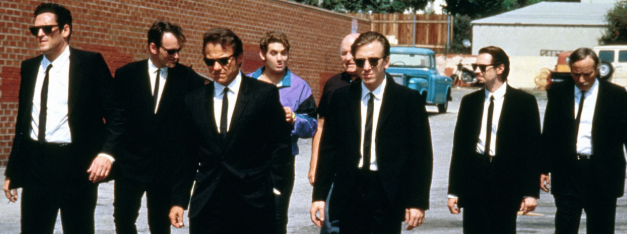
When talking about characters on the Opie and Anthony show, Tarantino talks about how the characters in his movie arise from his DNA, about how writing the best character is one of the most important things to him, and I think it shines through in his films. It's also what makes his movies stand apart as more than just flash in the pan pastiches that only film nerds can appreciate. If you needed to get the reference in Calvin Candie getting shot through the flower on his lapel relating back to Jack Palance getting shot through the same rose in The Mercenary, then the moment wouldn't work for anyone who hadn't both seen The Mercenary and could recall that fact in the moment. What makes it work is the fact that Calvin Candie is a great character and villain, that Dr. Schultz, the man who shoots Candie, is such a well written character where his decision makes perfect sense in the moment. The reference is fun for those who get it, but it's not required. What makes the moment work dramatically is the work that Tarantino has put into characters (through both writing and everything around the actors) leading up to that moment so that such a large dramatic turn in the film ends up both surprising the audience and making perfect sense to them at the same time.
And it's obvious that Tarantino puts the time into the characters. From writing, to casting, to directing, to editing, his movies feel like they were made for the characters. The worlds of the movies feel like playgrounds for Tarantino to have them run around which is why we're allowed so much time in them and his movies tend to run long. The dialogue, punctuated by profanity, feels natural without really aging. Even the first major speech in a Tarantino film (given by Tarantino himself as Mr. Brown) is about a piece of popular music ("Like a Virgin" by Madonna) and it doesn't feel dated even now because it's about more than just a reference to a song released in 1984, eight years before Reservoir Dogs came out, but because he makes it about a character revealing himself (essentially Mr. Brown's only real character moment). Suddenly, Mr. Brown isn't just that Tarantino cameo, he feels like a character whose life extends beyond the borders of the plot of the film.
Theme
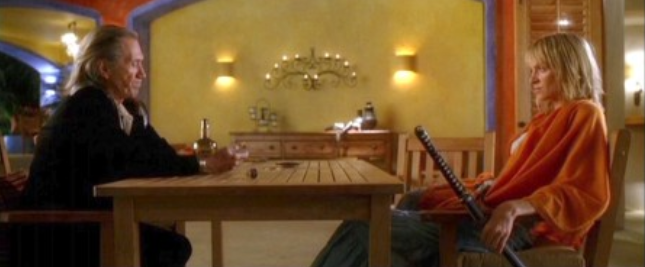
As with most directors, Tarantino has a certain set of ideas that he revisits through his films. Where Hitchcock focused on voyeurism and Gilliam focuses on fantasy, Tarantino's is the breakdown of codes of honor into revenge. From Reservoir Dogs to Once Upon a Time ... in Hollywood, revenge comes up as at least a minor part of the film. Mr. White killing Mr. Orange after Mr. Orange reveals his true identity, bleeding out, is revenge for what Mr. White sees as a betrayal of the code he assumed was between them. Kill Bill is all about one woman's revenge against the men and women who destroyed her new life and left her for dead. His revisionist history films (Inglourious Basterds, Django Unchained, The Hateful Eight, and Once Upon a Time ... in Hollywood) are all about Tarantino using his single tool of cinema to try and write what he sees as the wrongs of history.
And it's pretty obvious that Tarantino is pretty pro-revenge when someone betrays a code. Just to take Kill Bill as the main example, the Bride goes through two movies, dozens of Yakuza, and four highly trained hitmen to reach her main target, Bill. In particular, Bill was supposed to treat the Bride a certain way. It was implied that their relationship precluded the Bride from bloody vengeance, but Bill betrays that understood code. When she finally completes her long quest, she's seen as whole for the first time in the film. She was always missing something, and that something was her little girl, BeeBee whom Bill had stolen from her while she was in her four year long coma. Could she have just taken BeeBee from Bill without killing him? No, she couldn't have. In order to live the life she felt she deserved, with her daughter, Bill could not be alive. If she were to leave him alive, she'd never be at rest, always on the run. The only way forward was to kill her past since her past was never going to leave her alone.
And I have to say, that watching the Bride break down and cry in one of her only emotionally unguarded moments of the film on the floor of the bathroom in that little hotel room with BeeBee watching cartoons on the other side of the door, is one of the most emotionally satisfying things Tarantino ever pulled off. Are there lessons to be learned about life from the film? Probably not, but the point wasn't life lessons for us, it was to get us emotionally involved in the Bride's journey so that when she feels that wave of relief we can feel it along with her.
Dialogue
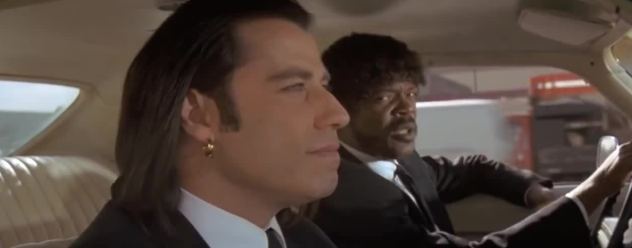
I would be remiss talking about Tarantino as a filmmaker without dedicating a bit more time to talking about his dialogue. Chris Tucker is renowned for ad lib on every movie, using the scripts as general guidelines as he said whatever he wanted, but he did the words of his character Beaumont that Tarantino had written word for word.
Tarantino's dialogue is fun. It's fast, intelligent, and profane all at once.
Do you know why the Royale with Cheese scene works in Pulp Fiction? It's not just because it's an amusing conversation, it's because that's how we get to know the first information dump about Jules Winnfield and Vincent Vega. Instead of simple expository statements about how Vincent had lived in Amsterdam for their boss, Marcellus Wallace, we get a realistic little conversation that highlights Vincent's views of Amsterdam that tells us so much more about him than where he's been for the last few years. We learn of his affinity for recreational drug use, his prototypical ugly American attitude while abroad, and that he has a certain worldliness that he may be trying to hide. It's not just amusing, it's insightful as well.
Nihilism
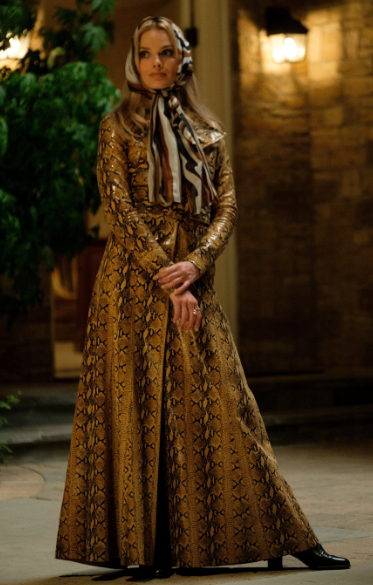
I've seen Tarantino described as nihilistic, and I honestly don't know where that opinion comes from, but I want to take a moment to address it. Tarantino loves to wallow in violence and gore, but he's not someone who writes movies about how nothing has any meaning and there should be no morality (that would be Lars Von Trier whose movie Melancholia I watched recently and it's on my mind). I think his love of violence and gore is window dressing on what is ultimately a very humanist philosophy about the worth of human life.
I would normally talk about Kill Bill here, but since I used the exact scene I would normally talk about when talking about character, I'll use Once Upon a Time ... in Hollywood as my example.
Tarantino's revisionist histories are him trying to mete out cosmic justice using cinema, and the subject of his ire in his latest film is the Manson Family, the hippie commune/cult that murdered Sharon Tate in 1969. Amidst all the luxurious details of life in 1969 Hollywood is the undercurrent of violence represented by the seemingly happy go lucky young females of the Manson Family. If Tarantino were a nihilist, he wouldn't be using his film to correct the historical wrong of Sharon Tate's murder, he would, at best, express no opinion about it, but instead he uses his film as revenge upon those who did wrong. He has the three cultists who show up at Rick Dalton's house (in a last second decision that turns them from their historical purpose to the cinematic one) where Cliff Booth and his pitbull violently murder two of the three, leaving the third bleeding from the face so that Rick Dalton can burn her alive with his flamethrower left over from his earlier World War II motion picture, The 14 Fists of McCluskey. Sharon Tate gets to live on, even providing Rick Dalton an implied career boost as thanks.
I think you can see there the odd mix of rampant violence and surprisingly gentle humanism at the core of Tarantino's work.
Always Learning
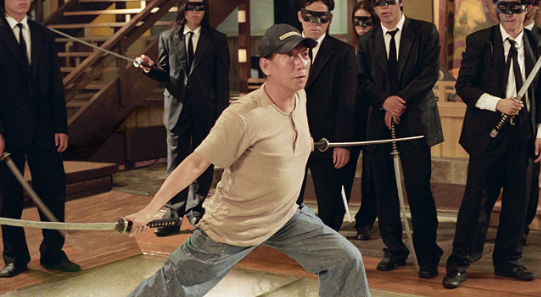
Probably the most surprising thing about Tarantino to me is how he went from directing Jackie Brown a wonderful and surprising little crime caper and blaxploitation pastiche without a single action scene to directing Kill Bill, one of the greatest action movies ever made. That's because he is surprisingly self-aware as an artist, understanding his own limits, and finding those people who can help him learn what he needs to learn.
Bringing this back to the beginning and Terry Gilliam, one piece of advice that Gilliam, as a mentor before Reservoir Dogs was more than a script, gave Tarantino was that he was never going to know everything about making a film. Instead of trying for the impossible goal of doing every job in order to figure out how to make his vision come to life, it was about hiring the right people who he could explain his vision to who would then make that vision a reality.
From Sally Menke, his editor through all of his films until her death in 2010, to Yuen Woo-Ping, the fight choreographer on Kill Bill, to his bevy of regular actors like Samuel L. Jackson, Christoph Waltz, and Uma Thurman, Tarantino has surrounded himself with people who are very good at what they do and that he can communicate with. Most directors do this, but I think it's important to note it with Tarantino since he seems to have a know-it-all reputation though he's actually very generous in his praise for those he works with when you actually listen to him.
In Conclusion
So, those are my thoughts on Tarantino in a nutshell, a 2,000 word nutshell. I think his filmography is great, and it goes far beyond anything resembling a "cool factor". He's talented, hard-working, and very good at what he does. He writes great characters with great dialogue and places them in stories that are steeped in film history and worlds that feel alive and expansive.
I also hope that he decides to do more than 10 movies, unlike his long promised retirement after the tenth. He should be making movies into his 80s like Bergman, Scott, and Kurosawa.
Movies of Today
Opening in Theaters:
Nothin'. There's a virus, dontcha know.
Next in my Netflix Queue:
Chisum
Movies I Saw This Fortnight:
Alice in Wonderland (Rating 0.5/4) Full Review "This is easily Tim Burton's worst film." [STARZ]
The Last Emperor (Rating 4/4) Full Review "The movie is sumptuous visually, compellingly acted, intimately involved in the history of the country, grand in scale, and intimate in scope. It's a triumph of cinema and one of the best movies of the 80s." [Personal Collection]
Kes (Rating 4/4) Full Review "The movie is a marvelous triumph of independent British cinema. It's intelligently filmed, using the setting with its rolling hills and coal mine in great contradistinctive ways. The acting is naturalistic and feels perfectly in place. Through it all is a clear emotional story that resonates. I love this film." [Personal Collection]
Airport (Rating 3/4) Full Review "Now, a note on my backwards viewing. It's really interesting to watch the ridiculousness toned down with every movie instead of turned up. I kind of wish there was a series of films that went this direction for real, but I kind of want to try this again." [Netflix DVD]
The Hunt for Red October (Rating 4/4) Full Review "It's exciting, really well made, well-acted, and intelligent. It's not only comfort watching, but high quality entertainment as well." [Personal Collection]
Monster House (Rating 3.5/4) Full Review "The movie is actually really fun, appropriate for young kids, and a good introduction to horror filmmaking to them." [Netflix Instant]
The Farmer's Wife (Rating 3/4) Full Review "Still, it's airy, light, and fun. A delightful little romantic comedy that attacks the viewer with several different types of comedy well. It's a fun diversion and another small victory for Hitchcock early in his burgeoning career." [YouTube]
The Lone Ranger (Rating 2/4) Full Review "The final action scene is almost worth the price of admission alone. If the movie were about 45 minutes shorter, I'd say that it was definitely worth the price of admission alone." [STARZ]
Contact
Email any suggestions or questions to thejamesmadison.aos at symbol gmail dot com.
Follow me on Twitter.
I've also archived all the old posts here, by request. I'll add new posts a week after they originally post at the HQ.
Street Entrepreneurs: "[i]Michael set up a chair outside the grocery stor ..."
Huck Follywood: "Posted by: Crusader at February 25, 2026 06:59 PM ..."
Eromero: "157 >>Yes, but they ran out of rum hours ago... ..."
Pug Mahon, aka Agent Frank: "I have occasional contact with a Somali young lady ..."
Accomack: "UConn vs St John’s on Peacock Should be a g ..."
Braenyard - some Absent Friends are more equal than others _: "Ilhan Omar https://tinyurl.com/3k8zuhep ..."
Joemarine: "64 I think Tourettes dude is full of $hit. Posted ..."
SpeakingOf: "It's interesting watching her behavior. Posted ..."
JackStraw : ">>Yes, but they ran out of rum hours ago... Wha ..."
Penguins of the World: "[i]Also, does she present an offending odor? Post ..."
Maj. Healey [/i]: "[i]148 I have occasional contact with a Somali you ..."
Quick Hits
Arrest in Terrorist Attack on Boise ICE Office: It's an AWFUL
Plus: FBI Raids LA School Superintendent's Home, School District Offices
BAFTA Tourettes Incident Pits the People Who Cancel Over #Racism Against the People Who Cancel Over "Abelism"
CNN: The Economy Is Doing Pretty Well, Just as Trump Claims.
Too Bad It's a Boomcession That Is Leaving So, So Many People Behind.
Democrat "Counter Event" To the SOTU Is, Literally, a Zoo of Lunatics
Trump Directs and Films the Main Political Advetisement for the Midterms
Wednesday Morning Rant
Mid-Morning Art Thread
The Morning Report — 2/25/26
Paul Anka Haiku Contest Announcement
Integrity SAT's: Entrance Exam for Paul Anka's Band
AllahPundit's Paul Anka 45's Collection
AnkaPundit: Paul Anka Takes Over the Site for a Weekend (Continues through to Monday's postings)
George Bush Slices Don Rumsfeld Like an F*ckin' Hammer
Democratic Forays into Erotica
New Shows On Gore's DNC/MTV Network
Nicknames for Potatoes, By People Who Really Hate Potatoes
Star Wars Euphemisms for Self-Abuse
Signs You're at an Iraqi "Wedding Party"
Signs Your Clown Has Gone Bad
Signs That You, Geroge Michael, Should Probably Just Give It Up
Signs of Hip-Hop Influence on John Kerry
NYT Headlines Spinning Bush's Jobs Boom
Things People Are More Likely to Say Than "Did You Hear What Al Franken Said Yesterday?"
Signs that Paul Krugman Has Lost His Frickin' Mind
All-Time Best NBA Players, According to Senator Robert Byrd
Other Bad Things About the Jews, According to the Koran
Signs That David Letterman Just Doesn't Care Anymore
Examples of Bob Kerrey's Insufferable Racial Jackassery
Signs Andy Rooney Is Going Senile
Other Judgments Dick Clarke Made About Condi Rice Based on Her Appearance
Collective Names for Groups of People
John Kerry's Other Vietnam Super-Pets
Cool Things About the XM8 Assault Rifle
Media-Approved Facts About the Democrat Spy
Changes to Make Christianity More "Inclusive"
Secret John Kerry Senatorial Accomplishments
John Edwards Campaign Excuses
John Kerry Pick-Up Lines
Changes Liberal Senator George Michell Will Make at Disney
Torments in Dog-Hell
The Ace of Spades HQ Sex-for-Money Skankathon
A D&D Guide to the Democratic Candidates
Margaret Cho: Just Not Funny
More Margaret Cho Abuse
Margaret Cho: Still Not Funny
Iraqi Prisoner Claims He Was Raped... By Woman
Wonkette Announces "Morning Zoo" Format
John Kerry's "Plan" Causes Surrender of Moqtada al-Sadr's Militia
World Muslim Leaders Apologize for Nick Berg's Beheading
Michael Moore Goes on Lunchtime Manhattan Death-Spree
Milestone: Oliver Willis Posts 400th "Fake News Article" Referencing Britney Spears
Liberal Economists Rue a "New Decade of Greed"
Artificial Insouciance: Maureen Dowd's Word Processor Revolts Against Her Numbing Imbecility
Intelligence Officials Eye Blogs for Tips
They Done Found Us Out, Cletus: Intrepid Internet Detective Figures Out Our Master Plan
Shock: Josh Marshall Almost Mentions Sarin Discovery in Iraq
Leather-Clad Biker Freaks Terrorize Australian Town
When Clinton Was President, Torture Was Cool
What Wonkette Means When She Explains What Tina Brown Means
Wonkette's Stand-Up Act
Wankette HQ Gay-Rumors Du Jour
Here's What's Bugging Me: Goose and Slider
My Own Micah Wright Style Confession of Dishonesty
Outraged "Conservatives" React to the FMA
An On-Line Impression of Dennis Miller Having Sex with a Kodiak Bear
The Story the Rightwing Media Refuses to Report!
Our Lunch with David "Glengarry Glen Ross" Mamet
The House of Love: Paul Krugman
A Michael Moore Mystery (TM)
The Dowd-O-Matic!
Liberal Consistency and Other Myths
Kepler's Laws of Liberal Media Bias
John Kerry-- The Splunge! Candidate
"Divisive" Politics & "Attacks on Patriotism" (very long)
The Donkey ("The Raven" parody)

